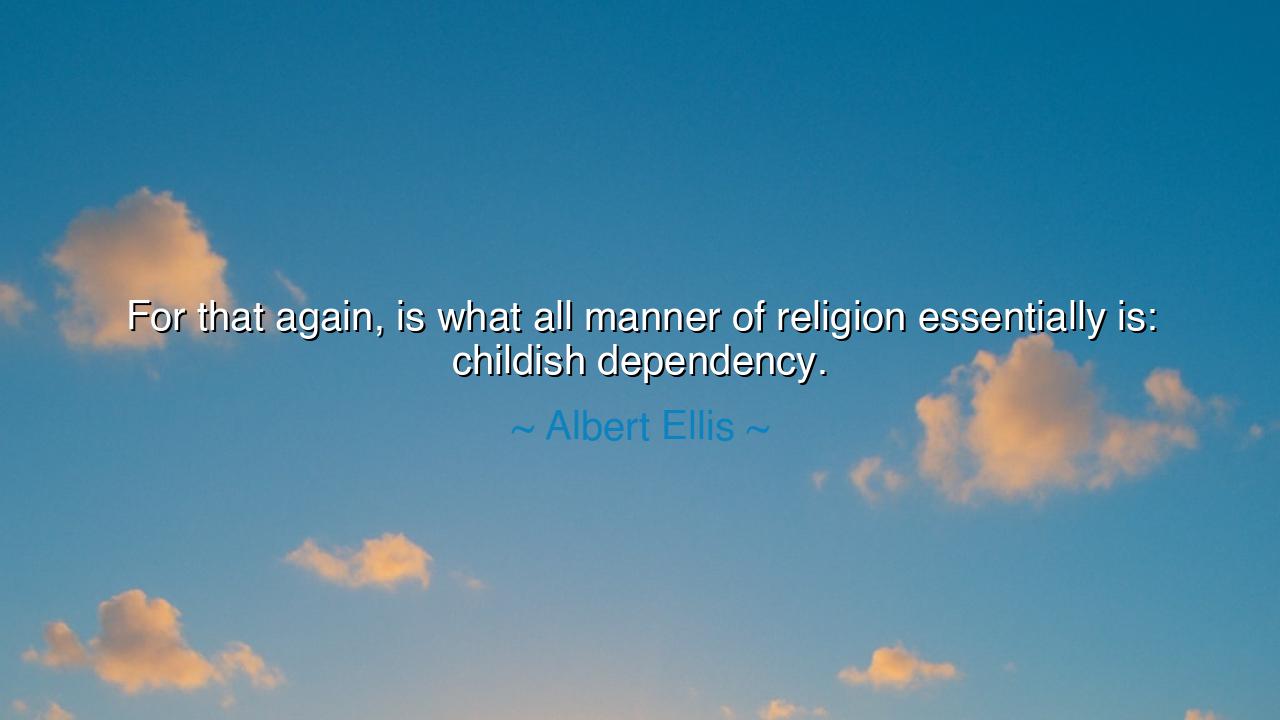
For that again, is what all manner of religion essentially is:






"For that again, is what all manner of religion essentially is: childish dependency." These words from Albert Ellis strike with the sharpness of a sword, cutting through the veil of tradition to expose a raw and uncomfortable truth. At first glance, this statement may seem to denigrate religion itself, but upon deeper reflection, it reveals a profound critique of the way human beings have historically approached faith. Ellis suggests that religion, in its most basic form, is an expression of dependency, akin to the way a child relies on a parent for safety, guidance, and assurance. In this context, faith becomes not a choice born of personal strength and enlightenment, but a form of dependency, a reliance on something greater than oneself to navigate the complexities of existence.
To understand the essence of Ellis's observation, we must turn our gaze to the roots of religion itself. In the earliest days of human history, when mortality was a constant companion and nature's forces seemed beyond comprehension, the need for comfort and certainty drove people to seek explanations and powers outside themselves. The birth of gods and spirits was, in essence, the birth of a way to cope with the overwhelming uncertainties of life. Humans, in their vulnerability, turned to religion much like a child would turn to a parent for protection. In many ways, religion served as a comforting narrative, a way to frame the chaos of existence in a manageable, understandable way.
But Ellis goes deeper, suggesting that religion is not merely a response to existential questions, but a form of dependency that can stifle growth. Like a child who is unable to make decisions for itself, religion can sometimes lead individuals to abdicate their personal responsibility in favor of following an external, often unquestioned, authority. Faith, in this view, is not a means of personal empowerment but a way of avoiding the complexities of life's true challenges. It is the easy path—a path that promises comfort but can also prevent the individual from developing the self-sufficiency necessary for true maturity and independence.
Consider the story of the Great Enlightenment thinkers, such as Voltaire, Hume, and Kant, who challenged the traditional religious dogmas of their time. These intellectual giants, in their pursuit of reason and rationality, rejected the idea that humans should be dependent on religious doctrines or supernatural forces to govern their lives. Instead, they argued that the true power of humanity lay in the ability to think critically, to embrace personal responsibility, and to make sense of the world without resorting to the crutch of blind faith. For them, religion was not a source of strength, but an impediment to human progress.
However, while Ellis's view on religion as childish dependency is harsh, we must also acknowledge that faith has played a pivotal role in shaping humanity's moral framework. Martin Luther King Jr., for example, drew heavily on his Christian faith to lead the Civil Rights Movement in the United States. His deep belief in the moral righteousness of his cause inspired him to confront oppression and injustice despite the immense personal costs. For King, religion was not an escape from responsibility, but a call to action—a call to fight for what was right and just. In this sense, religion can serve as a guiding force, not for dependency, but for the empowerment of the individual to transform the world.
Yet, Ellis’s words still hold weight when viewed through the lens of self-reliance and independence. True maturity comes not from depending on external forces to shape our lives, but from recognizing our own agency in determining our destiny. To grow is to move beyond the need for the crutch of religion—or any form of external authority—to guide our moral compass. The ancient wisdom speaks to us: self-knowledge, self-reliance, and inner strength are the true hallmarks of human growth. It is in choosing to stand alone, to make decisions rooted in personal responsibility, that we achieve the highest form of spirituality—one not dependent on a divine figure but grounded in the truth of our own human experience.
Thus, the lesson here is not to reject religion outright, but to understand its potential to limit us if it becomes a source of dependency rather than empowerment. We must seek to develop the wisdom to use religion, or any belief system, not as a crutch, but as a tool to enhance our personal strength and freedom. Faith should empower, not enslave; it should be a source of inspiration and courage, not a shield that keeps us from facing the challenges of life head-on. The path to maturity lies in striking a balance—embracing faith without allowing it to strip us of our autonomy and responsibility.






AAdministratorAdministrator
Welcome, honored guests. Please leave a comment, we will respond soon